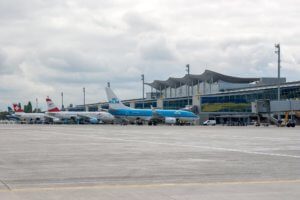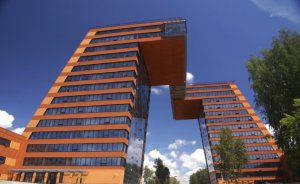
The Dutch Development Bank FMO and Diligent Capital Partners (DCP) jointly acquired 16% in Allseeds S.A. (Luxembourg), the holding company of a large Ukrainian vegetable oil producer and exporter – Allseeds Group.
“We needed to attract additional investments. FMO responded to the proposal and during the year we implemented the deal,” Allseeds Group CEO Viacheslav Petryshche said at a press conference in Yuzhne (Odesa region).
The deal was closed on September 19.
According to a press release from Allseeds, FMO and DCP jointly acquired shares, providing funding for the implementation of the Allseeds development strategy, which includes expanding the capacity for processing oilseeds, transshipment for the export of oils and meal and increasing added value.
As reported, the Antimonopoly Committee of Ukraine allowed the Dutch Development Bank FMO to indirectly enter the capital of Allseeds.
Allseeds Group was founded in 2010. In July 2015, the group commissioned an oil extraction plant at Yuzhny port with a capacity of processing 2,400 tonnes of sunflower seeds per day (or 1,800 tonnes of rapeseeds, or 1,500 tonnes of soybeans).

State-owned enterprise Spetstechnoexport and Turkey’s defense company Aselsan have signed a memorandum confirming plans to start production of Turkish tactical communications devices in Ukraine. An Interfax-Ukraine correspondent has reported that the sides signed the document at the 15th international specialized exhibition Arms and Security 2018 opened in Kyiv on October 9.
Spetstechnoexport Head Vladyslav Belbas told Interfax-Ukraine that the signed document confirms mutual commitments of the parties outlined in the offset agreement signed by Spetstechnoexport and Aselsan in July in Ankara after a meeting of the bilateral intergovernmental commission for defense cooperation. The details of the project are being approved.
As reported, in October 2017, Aselsan and Spetstechnoexport signed a government-guaranteed contract in Kyiv for the amount of $43.635 million for delivery of tactical communications to be used in the USB band in the interests of the Armed Forces of Ukraine in 2018 as part of the government defense procurement order. According to Ukrainian legislation, purchases of defense imports under the government defense procurement order amounting to more than $5 million provide for the conclusion of an offset agreement.
ASELSAN, COMMUNICATIONS DEVICES, PRODUCTION, TACTICAL, TURKEY

Kyiv Sikorsky International Airport (Zhuliany) is planning to reconstruct the main Terminal A with an area of 14,000 square meters and expand it by 9,500 square meters, estimating investment in this project at UAH 630 million.”The expansion of the terminal area by 9,500 square meters will help double its capacity,” the airport’s press service reported on Tuesday.
The airport’s press service told Interfax-Ukraine that the current airport capacity is about 700 people per hour.
Kyiv International Airport (Zhuliany) is located in the business center of the capital, seven kilometers from the city center. It is the second largest airport in Ukraine in terms of the number of flights and passenger traffic. The airport has three terminals with a total area is 21,000 square meters. Terminal B is separate facility for business-class service, it is part of the Fixed Base Operator (FBO) system. The airport’s runway is able to handle B-737 and A-320 aircraft. In the first nine months of 2018, the airport serviced 2.165 million passengers, which is 57.3% more than in January-September 2017.
AIRPORT, AREA EXPANSION, INVEST, RECONSTRUCTION, TERMINAL, ZHULIANY

Ukraine’s Economic Development and Trade Ministry has included the Bila Tserkva 2 industrial park (Kyiv region) in the register of industrial parks. According to the report posted on the ministry’s website, the park, 34th in the list, was registered under a ministry order of October 4, 2018.
The initiator of the creation of the industrial park on a land plot of 34.7138 hectares in the territory of the Shkarivka Village Council in Bila Tserkva district is Bila Tserkva 2 Industrial Park LLC.
According to the state register, the founder of the said limited liability company registered in June 2015 with a charter capital of UAH 1,000 is UDP Industrial Parks Limited (Cyprus), the ultimate beneficiary of which is businessman Vasyl Khmelnytsky.
In April 2018, the Economic Development and Trade Ministry registered the Bila Tserkva industrial park created on the initiative of Bila Tserkva Industrial Park LLC, which is owned by Khmelnytsky.
The declared period of operation of the Bila Tserkva 2 industrial park is 50 years.
The priority types of economic activity in the industrial park will be the production of food and non-alcoholic beverages; light industry (textiles, clothing), paper and paper products; and storage facilities.
According to tentative calculations, up to 1,100 jobs can be created on the territory of the industrial park.
According to the information on the website of the Bila Tserkva industrial park, which is part of the UFuture investment group, the project has been developing since 2016. The company plans to attract $100 million in investment and create 3,000 jobs.
The Plank Electrotechnic plant, the manufacturer of modern electrical systems, was created at the industrial park.
UFuture Investment Group, headquartered in Brussels, was established in autumn 2017.
BILA TSERKVA, ECONOMIC DEVELOPMENT, INDUSTRIAL PARK, TRADE MINISTRY, UFUTURE

Georgia exported around 60 million bottles of wine from grapes (0.75-liter bottles) in January-September 2018, 13% more than in 2017, the Agriculture Ministry’s National Wine Agency reported. Georgia exported wine to 53 countries in 9M 2018, up from 45 in the same period last year. Revenue from the exports rose 22% to $142 million. Russia was the leading importer of Georgian wine in the period, boosting imports 11.5% to 37.065 million bottles or 61.8% of the total.
Other major importers included Ukraine – 6.747 million bottles (11.2% of the total), China – 4.822 million (8%), Kazakhstan – 2.658 million (4.4%) and Poland 2.466 million (4.1%).
Georgia also exported 13.5 million bottles of brandy (0.5-liter bottles), 19% more than in 9M 2017, to 22 countries. Revenue rose 10% to $27.6 million.
Overall exports of wine, brandy and other products – chacha, other alcoholic beverages, wine materials and brandy spirits – were worth $222.7 million, 15% more.
Georgia exported 76.7 million bottles of grape wine in 2017, a 50% increase on the previous year. Exports to Russia were up 76% to 47.779 million bottles, accounting for 62.3% of exports. Russia banned imports of Georgian wine in 2006 due to quality complaints. Exports of Georgian wine to Russia were resumed in June 2013.

The European Bank for Reconstruction and Development (EBRD) has defined operational and strategic priorities in Ukraine for the next five years: privatization and improved governance in the public sector, energy security and energy efficiency, as well as strengthening the banking sector and developing capital markets. “The EBRD will pay special attention to projects that will integrate investment and policy engagement in areas such as privatization, energy security and efficiency, the financial sector, trade and infrastructure,” the bank said in a statement in connection with the adoption of a new strategy for Ukraine.
“The EBRD will help stimulate private sector participation across sectors and further commercialization of public sector firms. The bank will continue to support the implementation of modern public sector procurement as well as the introduction of proper public governance,” a bank press release reads.
“The EBRD’s operational and strategic priorities in Ukraine will rest on the following five pillars: promoting privatization and commercialization in the public sector to increase competitiveness and good governance; promoting the rule of law, fair competition in the private sector and support of companies that use best practice; strengthening energy security through effective regulation, market liberalization, diversified and increased production and energy efficiency; enhancing the resilience of the financial system by strengthening Ukraine’s banking sector, and by developing capital markets and non-bank finance; and improving integration by facilitating trade and investment, expanding infrastructure links, and supporting convergence with EU standards,” the document states.
“The EBRD will foster competition and support anti-corruption efforts. Special attention will be paid to improved skills and to the employability of disadvantaged groups. The bank will pledge more resources to create a market structure for sustainable energy and improved energy connectivity. It will assist in the creation of increased resource efficiency and will help promote renewable energy,” it says.
“The EBRD will promote a stable and efficient banking sector, a greater variety of non-banking financial channels and the use thereof. The bank will invest in improvements to connectivity through better infrastructure. It will also help facilitate increased trade and investment flows,” the bank added.